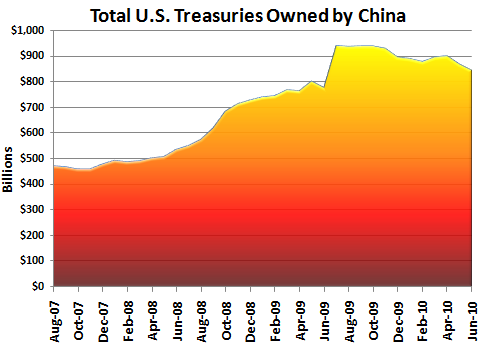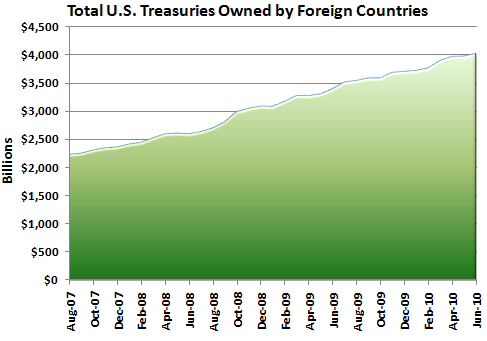While U.S. Treasuries are in hot demand, it appears that some of the largest holders are scaling back. China, in particular.
Looking at the total data may show that back in December 2009 there was a great in both dollar and percentage terms, but the biggest sell-off came at the longer end of the curve this time.
We are also hearing over the past few days that the big bond players like Bill Gross are selling off chunks of their government bonds. Has the level become too frothy?
We think so and have added a position in the 2X Inverse Treasury (TBT) for client portfolios.
From Bloomberg:
China cut its holdings of Treasury notes and bonds by the most ever, raising speculation a plunge in U.S. yields has made government securities unattractive.
The nation‘s holdings of long-term Treasuries fell in June for the first time in 15 months, dropping by $21.2 billion to $839.7 billion, a U.S. government report showed yesterday. Two- year yields headed for a fifth monthly decline in August, falling today to a record 0.48 percent.
Two-year rates will rise to 0.85 percent by year-end as the U.S. economy rebounds in 2010 from a contraction in 2009, according to Bloomberg surveys of financial companies. Reports today will show improvement in housing and manufacturing, signs of stability even as growth is less than expected, analysts said.
“Buying now is a big risk,” said Hiroki Shimazu, an economist in Tokyo at Nikko Cordial Securities Inc., a unit of Japan‘s third-largest publicly traded bank. “I don‘t recommend it. The economy is stable.”
Investors who purchased two-year notes today would lose 0.4 percent if the yield projection is correct, according to data compiled by Bloomberg.
The economy will expand at a 2.55 percent rate in the last six months of 2010, according to the median of 67 estimates in a Bloomberg survey taken July 31 to Aug. 9, down from the 2.8 percent pace projected last month.
Housing, Production
Housing starts rose 2 percent in July from June, according to the median forecast in a Bloomberg News survey of economists before the Commerce Department reports the figure today. Industrial production gained 0.5 percent, a separate survey showed before the Federal Reserve reports the data.
China‘s overall Treasury position fell for a second month in June to $843.7 billion.
“This may have been opportunistic,” said James Caron, head of U.S. interest-rate strategy at Morgan Stanley in New York, one of 18 primary dealers that trade with the Federal Reserve. “Look at the level of yields. If you‘ve held a lot of Treasuries, you‘ve done well.”
The People‘s Bank of China on June 19 ended a two-year peg to the dollar, saying it would allow greater “flexibility” in the exchange rate. The currency has since strengthened 0.5 percent.
The central bank limits appreciation by selling yuan and buying dollars, a policy that has contributed to its accumulation of the world‘s largest foreign-exchange reserves and led to the build-up of its Treasury holdings.
Domestic Investors
Treasury yields fell as U.S. investors increased their holdings to 50.5 percent, the biggest share of the debt since August 2007 at the start of the financial crisis, amid signs that a recovery from the longest contraction since the Great Depression has lost momentum.
U.S. reports last week showed retail sales increased in July less than economists forecast and inflation held at a 44- year low.
The two-year note yielded 0.50 percent as of 12:19 p.m. in Tokyo. The 0.625 percent security due in July 2012 traded at a price of 100 7/32, according to data compiled by Bloomberg.
China, with $2.45 trillion in foreign-exchange reserves, turned bullish on Europe and Japan at the expense of the U.S.
The nation has been buying “quite a lot” of European bonds, said Yu Yongding, a former adviser to the People‘s Bank of China who was part of a foreign-policy advisory committee that visited France, Spain and Germany from June 20 to July 2. Japan‘s Ministry of Finance said Aug. 9 that China bought 1.73 trillion yen ($20.3 billion) more Japanese debt than it sold in the first half of 2010, the fastest pace of purchases in at least five years.
Diversification Strategy
“Diversification should be a basic principle,” Yu, president of the China Society of World Economy, said in an interview last week, adding a “top-level Chinese central banker” told him to convey to European policy makers China‘s confidence in the region‘s economy and currency. “We didn‘t sell any European bonds or assets. Instead we bought quite a lot.”
China held 10 percent of the $8.18 trillion of outstanding Treasury debt as of July. Investors in Japan hold the second- largest position in Treasuries with $803.6 billion of the securities, or 9.8 percent. Total foreign holdings rose 1.2 percent to a record $4.01 trillion, the Treasury said. China‘s holdings peaked in July 2009 at $939.9 billion.
China needs a strong U.S. dollar, said Kenneth Lieberthal, a senior fellow specializing in China at the Brookings Institution, a research group on Washington.
“I don‘t think we‘re going to see any massive flight from China‘s holdings of U.S. debt,” Lieberthal said on Bloomberg Television. “That would be self defeating and they well recognize that.”
___


















